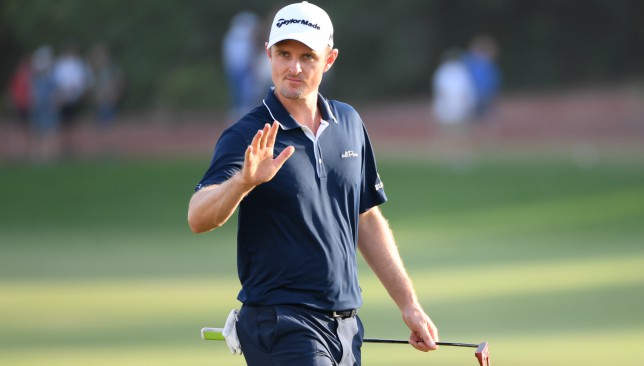
All week Justin Rose has carried an air of superiority around Jumeirah Golf Estates. Not in an arrogant, boastful or boorish way, far from it, but every day when the world No6 stood on the first tee at the Earth course he gave the impression he knew he was the best golfer among the 60 of the European Tour’s finest gathered in Dubai.
An understated confidence, few sportspeople carry so naturally.
And along with his own self-belief in his ability, there was the experience and form to back it up.
Even in the pre-tournament press-conferences, the difference in tone between himself and Race to Dubai rivals Tommy Fleetwood and Sergio Garcia was marked.
Garcia was largely pessimistic, with good reason given his considerable points deficit against the backdrop of having to switch clubs on the eve of the tournament, while Fleetwood preached a happy-go-lucky, just-pleased-to-be-here type narrative, also with good reason considering his surprisingly outstanding year.
Rose was as fixed and focused in what he said as he was in his application on the course over the next three-and-a-half rounds.
Along with a video showing him on the practice range at 5am, there was an illuminating quote into his approach on Wednesday when he said: “I think I focus a lot more on the skill of putting rather than the technique. By that, I mean green reading, and then performance drills on the green.”
Wasn’t my day… 🎩 off to @TommyFleetwood1 on a great year and winning the Race to Dubai, and @JonRahmpga winning today. 🇦🇪 pic.twitter.com/KstA8iB0Tg
— Justin Rose (@JustinRose99) November 19, 2017
To watch Rose with his claw putter was at times like some kind of performance art mixed with his own brand of trigonometry.
Every golfer has their own individual routine and ritual in approaching shots but Rose’s appears truly unique. The 37-year-old would at times appear to pick out objects in the distance with his eyes, adjust his body accordingly, then place his hands in line with the hole, before tracing the line of the putt downwards in the air using two fingers.
And it worked. For it wasn’t his putter which let him down in a truly remarkable turn of events at the DP World Tour Championship.
As methodical, thorough and efficient as his golf had been for 65 holes, something happened on the back nine that will take some getting over. The previous 27 holes from 10-18 on Earth he was a combined 10-under. He had one solitary bogey in that span, on the 18th at the end of his second round.
The monster 626-yard 14th where he found water and scrambled for a six, he had birdied twice and eagled on day one.
Of all the players in the field, based on how he had played near flawlessly, his experience, manner and confidence around the course, Rose was the least likely to suffer such a blow-up. He claimed he “hit the wall” as he discussed his near miss – a result, if anything, contextually closer than his second placed finishes in 2012 and 2014.
Maybe the sheer intensity he had placed on himself began to take its toll mentally and subsequently physically? This was a tournament he desperately wanted to win. The man’s an Olympic and US Open champion, though, he’ll know better than anyone. He’ll also recognise that golf is a sport unlike any other to the extent that even the very best win more than they lose.
And in defeat he was as imperious as he had been around the winding route of Earth over the four days. Immediately congratulating Fleetwood, a man he could well have by his side at the Ryder Cup next year, with a warm embrace.
It wasn’t necessary politeness or empty platitudes, there was genuine pride for a young Englishman enjoying the best moment of his career to date.
And while it was Jon Rahm who ultimately proved the best player in Dubai, Rose has no reason to be dissuaded from his own self-assessment, as subjective as that is.
But what was clear was a tangible feeling that there is now something of the statesman about him. Setting examples for the younger generation of Rahm, Fleetwood, Tyrrell Hatton, Matt Fitzpatrick and others, both in how he plays golf and his conduct off the course.
At the Ryder Cup next year he could prove to be Europe’s most important player, setting the tone for a clutch of European talent emerging taking on an outrageously-gifted American team.
A situation where more than sheer golfing ability will be required, and all his own qualities will need to be replicated by his
team-mates.
Rolling into the 2018 @europeantour season!! 🇦🇪 ➡️🇭🇰 pic.twitter.com/Ch1VNM2kux
— Justin Rose (@JustinRose99) November 19, 2017